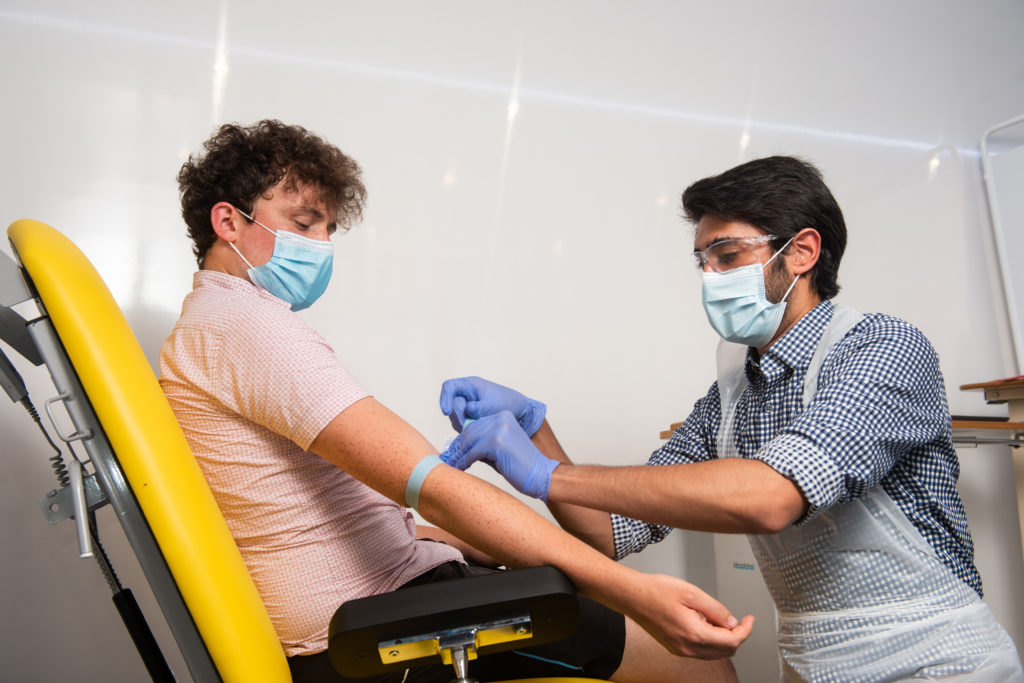Blood processing at The Jenner Institute. Pic: University of Oxford, John Cairns
Covid-19: Oxford Vaccine Trial makes landmark step towards vaccine against coronavirus
The Oxford University-led coronavirus vaccine trial passed two important hurdles this week: whether the vaccine will be safe to use and whether it induces good immune results. The trial’s Phase I/II results indicate the vaccine has no early safety concerns and induces strong immune responses in both parts of the immune system. The team declared the results “a step towards the discovery of a safe, effective and accessible vaccine against coronavirus.”
The study was published by scientists at Oxford University’s Jenner Institute and Oxford Vaccine Group in medical journal The Lancet on July 20, and reports the vaccine provoked a T-cell response within 14 days of vaccination (white blood cells that can attack cells infected with the SARS-CoV-2 virus), and an antibody response within 28 days (antibodies are able to neutralise the virus so that it cannot infect cells when initially contracted).
The team explained that participants who received the vaccine had detectable neutralising antibodies, which have been suggested by researchers as important for protection, and these responses were strongest after a booster dose, with 100% of participants’ blood having neutralising activity against the coronavirus.

Oxford Vaccine Group Clinic. Pic: University of Oxford, John Cairns
Professor Andrew Pollard, chief investigator of the Oxford Vaccine Trial at Oxford University and co-author of the study, said: “The Phase I/II data for our coronavirus vaccine shows that the vaccine did not lead to any unexpected reactions and had a similar safety profile to previous vaccines of this type. The immune responses observed following vaccination are in line with what previous animal studies have shown are associated with protection against the SARS-CoV-2 virus, although we must continue with our rigorous clinical trial programme to confirm this in humans.”
“We saw the strongest immune response in the 10 participants who received two doses of the vaccine, indicating that this might be a good strategy for vaccination,” he added.
The UK Phase I/II trial began testing ChAdOx1 nCoV-19 in April 2020. The team began work on developing a vaccine against coronavirus in January, and have since been working with unprecedented urgency.
During the Phase I/II trial the vaccine has been evaluated in more than 1,000 healthy adult volunteers aged between 18 and 55 years in a randomised controlled trial. A subset of these volunteers (10 people) received two doses of the vaccine. Between April 23, 2020 and May 21, 2020, 1,077 volunteers received ChAdOx1 nCoV-19 or a placebo MenACWY vaccine. There were no serious adverse health events related to ChAdOx1 nCoV-19.
Leading scientists on the Oxford Vaccine Trial explain the Phase I/II results and what they say about safety and the immune response it creates in humans:
The University of Oxford is working with biopharmaceutical company AstraZeneca for the further development, large-scale manufacture and potential distribution of the Covid-19 vaccine, with plans for clinical development and production of the Oxford vaccine progressing globally. The project has been spurred by £84 million of Government funding to help accelerate its development.
Oxford and AstraZeneca are collaborating with clinical partners as part of a global clinical programme to trial the Oxford vaccine. The programme is made up of a Phase III trial in the US enrolling 30,000 patients, a paediatric study, as well as Phase III trials in low-to-middle income countries including Brazil and South Africa, which are already underway.
AstraZeneca remains committed to providing broad and equitable access to the vaccine, should late-stage clinical trials prove successful. So far, commitments to supply more than 2 billion doses of the vaccine have been agreed with the UK, the US, Europe’s Inclusive Vaccines Alliance (IVA), the Coalition for Epidemic Preparedness (CEPI), Gavi the Vaccine Alliance and Serum Institute of India.
